I enjoy the 150 photos posted on EastSouthWestNorth. They are about real China. I don’t know whether the original source of the photos. I assume it is the web site, and credit goes to EastSouthWestNorth. I am re-posting some of the photos from the site, with my comments. I only pick those I personal feel very familiar to me, and add my observation to it. I hope the effort will help people who don’t know China to see the other side of the country, instead of just a country related to "Human Rights", "Tibet"… (I admit my own ignorance that only after I really took time to study what happened in Darfur did I understand Darfur is actually in Africa. I guess China may be the same for many people, who cannot really point out where China is on a map).
About the Photos
These photos are quoted from the web site EastSouthWestNoth. I don’t know the photographer, so I cannot gave credit, but the photos are very good and reflect real China very well. If anyone know who is the photographer, please let me know, and I do want to give big credit to him/her/them.
About My Selection
There are many photos in the original site. Most of the scenes look very familiar to me because I saw it all the time in the last 20 years. But I will only choose those scenarios I have personally experienced. I just don’t have camera at that time, and I don’t have the skill to capture the scene, but they did exist in my memory.
Also, most of the photos seems to be taken in 1990s in China. It is not current China. For current China, hopefully my site helps – I have many photos! Here come the Photos.
Getting on to Train
Below: too many people to get on to a train. This is exactly my initial memory of a train. I also entered a train via window! My memory is even worse than this photo. My home town is Henan, the province with biggest population, and there are just very few trains at that time. It is basically a war for everyone – people inside are fighting very hard to close window, to avoid people crawling in (thus make it even more packed), and people outside are "attacking" the window. If there is one open window, it is just like a hole in a dam – many people will get in and there is no way to close the window before the train moves – after train moving, there will still be people in the middle of the window! To be short, my memory of train is even worse than this image. Look, there are still open window there at least. Imagine what it looks inside. Bathroom is full of people, and no one can manage to move. People are everywhere – on the top at the luggage rack, on the floor under each bench, sitting on top of the back of the seat, or just manage to keep balance on the table. It is not news if someone manage to take 10 hours of train ride with only one foot on the ground. This was my experience back in 1990s. If there were color on the photo, you will see the train is green.
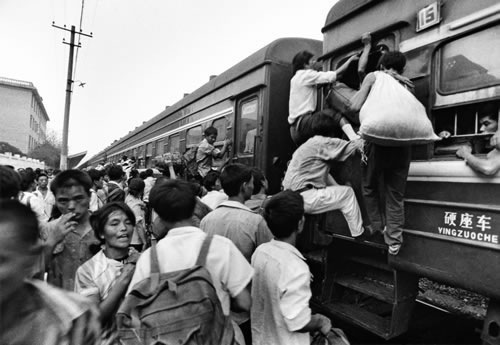
Now the trains are replaced with CRH trains (with photo), and this scene is very rare in China now (I don’t think it has completely gone away, since during Spring Festival, in some section, this scene may also on show). If you ask me, I am pretty happy with the change, and talking about human right? I stand firmly that we need more freedom in speech, and political rights, but the right to enter a train from door is also part of human right, and I HAVE TO give credit to people who made it happen. (Of cause, we need to reflect as a nation about who pulled the rich country in the past into the bottom of poverty and chaos).
45 Minutes Line for WC
According to the original title of this photo, the train station is full of people going down south to work, so that the bathroom line is longer than 45 minutes. I don’t experience that long line myself, since the line for men’s room is always shorter than the women, but I do experience situation when there is no WC at all. In my life (in early 1990), it is not something shy to piss at the side of the road. In the village I was born (photos), water closet is just some new, and it didn’t exist when I left the village when I was 5 year old. There is a well in the village, and all water comes from the well. Restroom by definition, don’t have water in it.
For my mother’s hometown, they don’t have water at all, and they have to go very long way to get very limited water. A bowl of water can be reused for many days before drop it away. This was the real situation when I was born. Until today, my mother has the habit to save every drop of water. Now they can use pure water.

This is true during my trip just 4 years ago, in a tourist group to Daocheng, the Tibetan area. The first lesson the tour guide, a lady taught us was how to "sing" in the Tibet area. By "Singing", she means to go to WC. When tour bus stops, men and women get off the bus and find his/her own places. General rule is, women find further places, and men just do it near the bus. I believe it is the same today.
Again, I do love more human rights in China. When I have a house, and have good job, and I want more. I want my void heard. But I am also aware that human right mean a place to piss in private with dignity. I see the change in the last 20 years as a history of improved human right record in China.
Money
This is the Instant lottery ticket purchase line some where in China. I have experienced something similar – not so many people, but pretty close.

To get rich is not easy, especially in early days of China. People have enough time and ambitious enough dream to get rich. How to do it? Lottery seems the only way that everyone can participate. I was one of the person who bought lottery back in Luoyang, and dreaming to get something big. I did won a soap or two with many many tries when I was young. In Shanghai, recent years, there are still lottery like this (see the first photo, taken in 2003), but it is not the only way to get rich today. Something to note is, at that time when the photo above was taken, the job market is not open yet, and people don’t have the right to choose a job yet, and just recovered from the thinking "Money is the worst thing in the world".
I have two observation. It is the crazy idea of communist to turn people into extreme poverty, and we don’t have enough reflection on it yet. However, in the economic field, China government did something right in the last 30 years.
Below: Roadside vendor selling to railroad passengers. I saw this and it happens in some section of China these days. I don’t buy from them but many people buy – I think it is good for local economy. Long the railroad, in tourism area, in many middle and west part of China, vendors like them are everywhere. We experienced the same thing in Cambodia – a sign of poverty. I do have great respect to them, although many people
got annoyed by them. I read many foreign visitors to China wrote about the unpleasant experience to be surrounded, or traced by the local vendors, and they refused their offer pretty rudely, and even think they "don’t understand how to be polite". Well. I can be polite if I have something to eat, and have something to raise my children. It does not mean anything to be polite if I am starving.

I am writing a blog about Shanghai, since I am living in this amazing city in China. However, Shanghai’s situation does not represent China at all. The image I showed is more like China. However, take into consideration that these photos are taken about 10 years ago (I don’t know when they were taken exactly though), and things changes faster than everyone’s imagination.
I hope they can get a better life first – to be able to get some money to improve their lives. Democratic is important, I believe. I hope they can find a way to manage their village better, both politically, and (more importantly) economically.
I saw someone criticizing that people in China take economic progress too seriously. Well. If I were the railway vendors, I do take it more serious than "environment", "human rights", "freedom" that many people care. I hope one day, they care about these human rights, but only after they have a better economic right. (Meanwhile, I believe democratic in some sense help economic growth).
Haircut and Food
I love this photo: Street barber in a demolished room. I don’t see it in Shanghai these days (in the recent few years), but it is how people have their hair cut before. I didn’t personally experienced it, since when I was young, I went to barber shop in a room, not on the street. But I do see many older people at the same time (1990s) choose to have their haircut on the street. A room is too fancy for simple job like haircut.
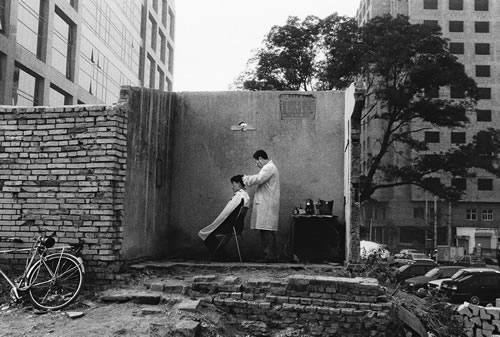
I am pretty familiar with this, and I was a loyal customer of these out-of-school youth selling cooked yam on the street. In my hometown, they typically sell baked potato, not yam. There are many of them. On the street, there are many shops until recently. When I came to Shanghai, I heard the news that in this city, shops offering eat on the pedestrian road is not allowed, I thought: "It is crazy! Is there any restaurant selling small things like this can afford to rent a room?" Later, I know that is the difference between a rich city like Shanghai and a poorer city like Luoyang (Luoyang is not a poor city in any way, so imagine China).

I believe even people who haven’t come to China may heard of some terrible story about the hygiene status of China. Many of my foreign friends are very cautious in China regarding food – they can easily got sick after eating something we eat everyday. Well. I admit it is true. However, the point is, to have clearer food is a human right, isn’t it? Everyone wants that right, but for 1.3 billion people to have this right is not very easy. I am in Shanghai, and I don’t eat those "tasty" food any more, but I know when one day, the food get clearer in my hometown and in most other places in China, we are improving human rights in China. I hope everyone can do something positively to improve the human right record.
Law
Below: "The cadres visit the village to explain the law, and are treated to a work meal of potatoes".
From the mud wall, I guess it should be somewhere in the middle of China, where my hometown is. Now to mention the farmers in villages, even people in Shanghai like myself don’t have a clear law concept. I can tell you that I have never been to the court in my life yet: never got sued, and never sued anyone. Law is something new to many people. The change from empire ruled country in Europe took many decades, and American were lucky enough that they don’t have that kind of history when the nation was formed. China is different. In previous entries, many people use the word of "brainwash" to describe the behavior of Chinese people. I agree that some of the blind-nationalism and put an equal sign between party and the country is due to propaganda and brainwash, but many other things are rooted far more than the recent 100 years. It is rooted in the long history of China. If you call it "brainwash", just call it, since in some sense, culture can be regarded as "brainwash" in long enough years, so the group of people have pretty unique way of thinking. The thinking logic is pretty common among one group of people but distinctly different from another group of people. We call it historical and cultural different, right?
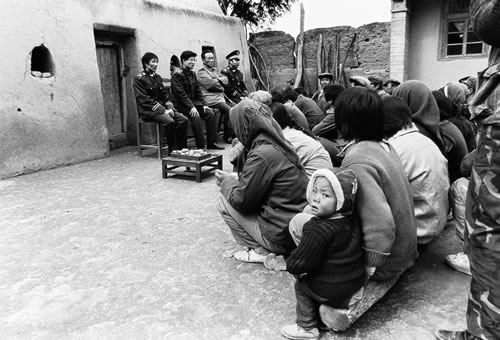
Population
Below: A peasant woman and her ten children.
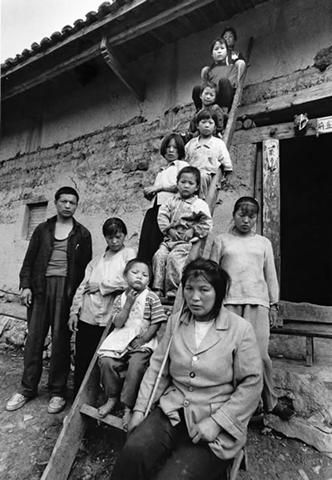
People in China love to have more children. People in China love to have boys. Please wait to point fingers to the peasant woman on the photo and judge what she did with your value system.
For a peasant family, number of children is almost equally to the production power of the family and hence the economic return of the family unite. For a highly urbanized Europe or North America, and especially after the industrial revolution, people just need a job to survive. In the vast rural area of China, a family is almost can be called a company (I know it is inappropriate, but you can loosely think that way), and number of children can also be thought as number of employees. The more employees you have, the stronger the family are. (For my friends in China, I know it is not EXACTLY the real situation, but I think it is pretty easier for people interested in China to think that way. For my readers, please don’t get mislead by my comparison, if you have a chance to learn more about how rural areas in China works.
The other reason is the thousands of years of family value in China. As I stated in article The Name of Chinese People, I am the 20th generation in my family tree, and my family book have detailed record of every single person in the family tree since the year of 1380 – my son Yifan, me, my father, his father, and 19 generations before him. The traditional way to record it is just to use male in the family, and female didn’t appear in the book. The family book has been past down for 500 years (in my family), and there are efforts from the family to find out the book before the year of 1380 (For your information, our family migrated from another province in that year). Many other family has more than 1000 years of record. Imagine the proud and the family value! Also imagine what if you don’t have a boy to keep the book going, and your branch in the book ends at you. This explains why people in China love boys.
Recent 50 years changed it. People don’t take family book as serious as before, and I don’t know whether we should be happy or unhappy about it, whether as a nation, we are lucky to abandon it, so we don’t have the pressure to have boys, or we are unlucky to be the generation to stop the tradition that has survived in so many years.
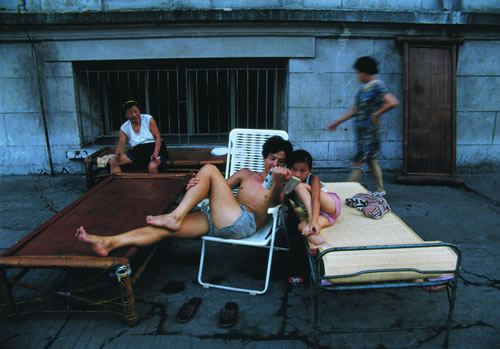
This is
common scene in my hometown, Luoyang. In summer, people get to street, and cool down for heat. People have different definition of privacy and public image. If it is accepted by local, what’s the point to say it is uncivilized (as I saw many comments from blogs and travelogue by foreigners?)
Below: The commune wash room in an apartment building.
I love this picture a lot since I lived in this environment for two years since I was 4 years old, until maybe 6. If someone had a camera, they may caught me like the little child in this picture.
![image3[1]](https://home.wangjianshuo.com/archives/2008/f807dcd8573b_12659/image31.png)
That is the living standard of many Chinese in 1980s.
Relationships between people are pretty different than the current relationship in China (change in China), and also very different from the families in U.S. today.
P.S. Disclaimer
As a routine, whenever I post something related to the topic of China, I have to put a disclaimer here: Please first read a story called Blind Men and the Elephant and understand everyone is a blind man who can only possibly see part of world, and we have to accept the truth is, the same thing will definitely appear to be different to different people, and we also need to accept the really that there are many different but all correct answers to the same question.
China is so big a topic, and it means the people, the government, the land, the culture, the history and many things, and it has bright side as well as dark side; it has its hope and desperation; it is mixed of the best and the worst. In any article, I can either focus on something good, or bad, but hardly can be both. Whenever I post bright side of China and express my hope to my country, there are enough comments pointing out that I ignored the bad side. What comments are exactly the truth! When I write the dark side of this country, and show my worry, there are almost the same amount of comments pointing my finger about my limited knowledge about the whole China (or the elephant in my story). These comments, again, are very correct, since no one in this world is in a position to tell people what China really is, just like the blind men in the story.
My experience – where I was born, how I am raised, cities and villages I have lived in, and how I am treated by people around me, my job, my education, my luckiness or unluckiness, my love or hate, my hope or desperation – are only mine. If you think differently, it is the best time to share what you see China, from your perspective. Please do so now and that is why we have comment function on this blog. ( YLF )

































![image[2]](https://home.wangjianshuo.com/archives/2008/FlightfromShanghaitoNanyangHenan_143C3/image2.png)
![image[5]](https://home.wangjianshuo.com/archives/2008/FlightfromShanghaitoNanyangHenan_143C3/image5.png)







![image[16]](https://home.wangjianshuo.com/archives/2008/OnMyWayBacktoNanyang_142C8/image16.png)









![image3[1]](https://home.wangjianshuo.com/archives/2008/f807dcd8573b_12659/image31.png)

